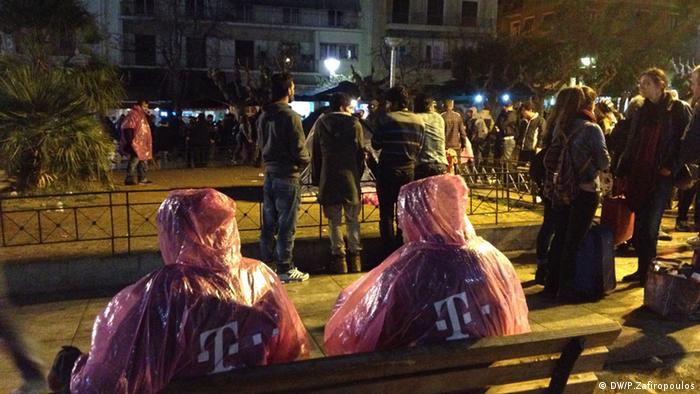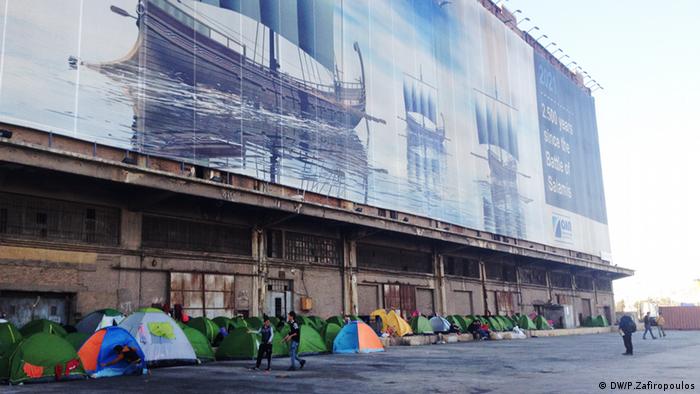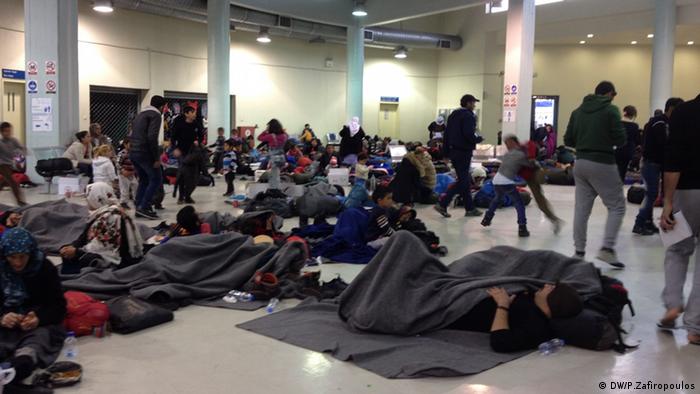Refugees suffer as Greece, EU pass the buck
Deliberate foot-dragging inside and outside Greece's borders have rendered a humanitarian crisis in the EU more likely, reports Pavlos Zafiropoulos from Athens.
On February 24, 20-year-old Sabeen* sat in the port of Piraeus outside a crowded temporary refugee camp housed in a building once used as a waiting area for tourists heading to the Greek islands. She had just arrived together with several hundred other migrants and refugees and was hoping to continue her journey to northern Europe without delay.
Sabeen was the last of her family to abandon Syria. Her mother and siblings are already in Denmark, her father was killed in the war. Sabeen initially resisted leaving her country, hoping the war would end and she would be able to complete her degree in dentistry which she has studied for two years. But the recent bombing of her hometown of Aleppo rendered that impossible. "My home is crashed," she then told DW. "I just want to go to my mother. I just want peace."
But timing was not on Sabeen's side. As she prepared to make the hazardous sea crossing from Turkey to the Greek islands, Austria began imposing strict daily limits to the number of refugees allowed to enter its territory. Other countries along the Balkan Route swiftly followed suit, slowing the number of refugees from leaving Greece over the Macedonian border to a trickle of 200-300 a day at best.
Twelve days later and with Europe's leaders debating whether the route should be described as 'closed' or not, Sabeen remained trapped in Greece, living in the fields around the Idomeni border crossing in increasingly dire conditions. The refugee camp was initially set up to host about 1,500 refugees for a few days at a time. Today 14,000 people are estimated to be in the camp which swells daily with new arrivals. "The situation is very terrible," she told DW by phone. "I am afraid here because there are some bad guys around and they know I am without my family."
Strategic negligence
Currently over 36,000 refugees and migrants are thought to be trapped in Greece with the islands receiving roughly 2,000 new arrivals from Turkey every day. The rapidly worsening situation has left the Greek government scrambling as it desperately tries to set up new camps to house the migrants and avoid a full-blown humanitarian crisis.
Yet the move to close the Greek-Macedonian border, while sudden, was hardly far from unexpected. As such the government has come under fire for not doing more to prepare for such an outcome. Those criticisms echo those heard in many European capitals where Greece is suspected of exacerbating the problem through a form of strategic negligence in order to draw concessions from Europe.
Those criticisms are probably not all entirely misplaced. "I believe that for the first 6-7 months [of the Tsipras administration] there was a strategy to consciously do nothing," says Angeliki Dimitriadi a Visiting Fellow at the European Council on Foreign Relations and Research Fellow at the Hellenic Foundation for European and Foreign Policy. "They had the opinion that if they let the irregular flows move on, then it would become a European problem and it would have to be solved at a European level."
However Dimitriadi argues that this approach ultimately backfired on the Syriza government which ended up on the wrong side of both geography and the change in sentiment in Europe following the Paris terrorist attacks and the Cologne sexual assaults. "They took a political risk. They didn't realize that other European countries would offer financial support much easier than they would relocate people. Especially now that the discourse is focused much more on security than humanitarian concerns." As such Greece is left with promises of financial support, but lost time and goodwill in setting up the necessary infrastructure to handle large numbers of migrants and refugees remaining in the country. Meanwhile the borders look set to remain shut.
The Greek migration ministry has endeavoured to ramp up efforts to meet the country's commitments in setting up hotspots and screening and registering migrants. Ministry sources now bristle when asked about accusations of delays, arguing that other European countries are behaving hypocritically.
"Whatever Greece has committed to doing it has now met," a ministry source told DW, saying that the hotspots were close to fully operational and that there were already places for 20,000 migrants with another 10,000 due to be prepared within the next 10 days. "But say we create another 20,000 places, is that the issue? The issue is for the relocation program to operate and for other European countries to live up to their obligations."
Refugees as bargaining chips
Dimitriadi argues that Greece is only one player in a large and complex phenomenon.
"I don't believe that the Syriza government's policies significantly increased the flow of refugees," she says, "what they could have done is have improved the structures in place. But only Turkey could realistically reduce the flow, and let's be honest, they haven't wanted to. There has been a long-term instrumentalization of the refugee crisis on the part of Turkey which Greece could never counter."
The view that Turkey has sought to use the crisis to extract concessions from Europe was all but confirmed at the EU-Turkey summit. At the same time there are few signs of a crackdown on the people smugglers operating in Turkey even in the face of the NATO operation in the area. According to a recent article by the Kathimerini newspaper, last Thursday the Greek Defense Minister presented a NATO report concerning two ships (one German and one Canadian) taking part in the operation. According to the report, 30 dinghies carrying refugees were identified and their coordinates sent to the Turkish authorities, but only three were ultimately intercepted by the Turkish coast guard.

Greece is struggling to accommodate the daily influx of refugees forcing many to camp out in the open
Even in the best-case scenario, it now appears highly likely that Greece will very soon have to house upwards of 50,000 migrants and refugees who will have no choice but to stay for an extended period of time in a country ill-prepared to accommodate them. While the recent worsening of the crisis in Greece has seen impressive food-drives spring up around the country in recent days, NGOs warn that such efforts will not be enough.
"In Idomeni alone we currently need 30,000 meals per day," Marie-Elizabeth Ingres, Medecins Sans Frontieres' Head of Mission in Greece, told DW. "The current actors cannot manage the situation alone... What I hope for is a common European policy that treats refugees as human beings who have a right to flee war and persecution."
Or to put it another way, for the people like Sabeen who are currently living in tents in a damp field next to a closed border to be treated as something more than political bargaining chips.



No comments:
Post a Comment